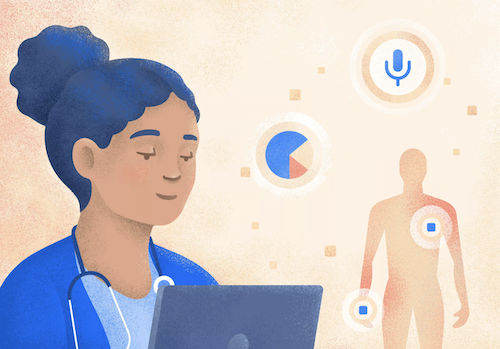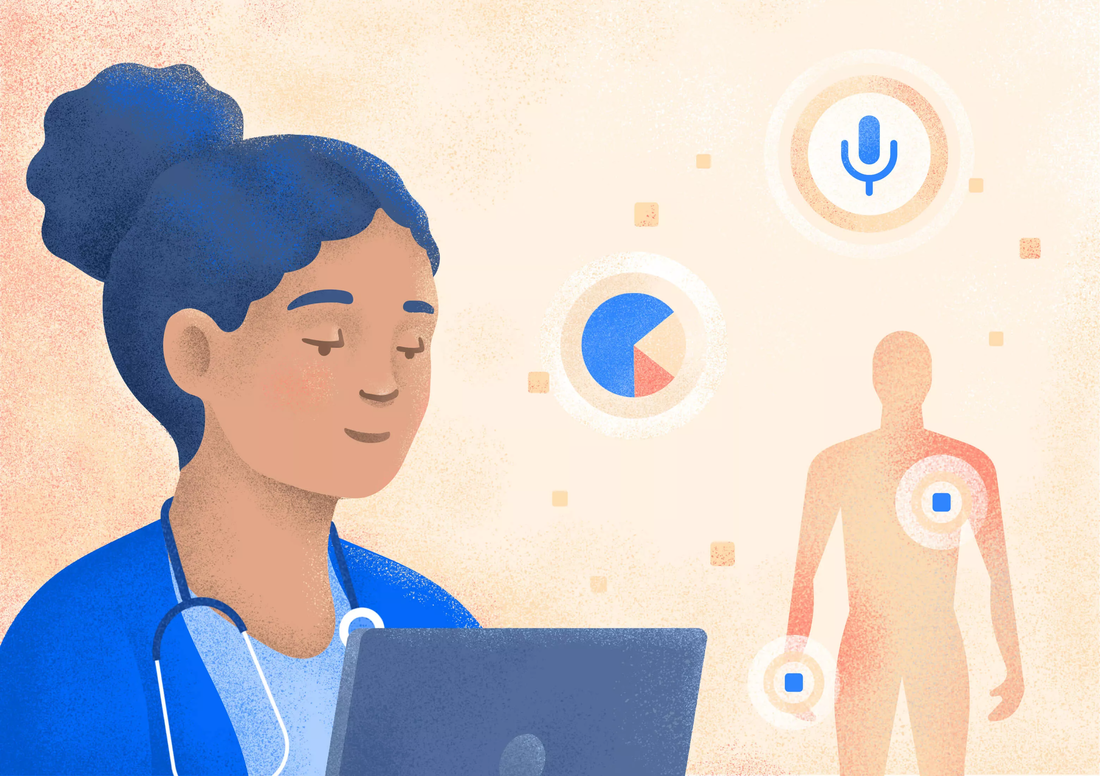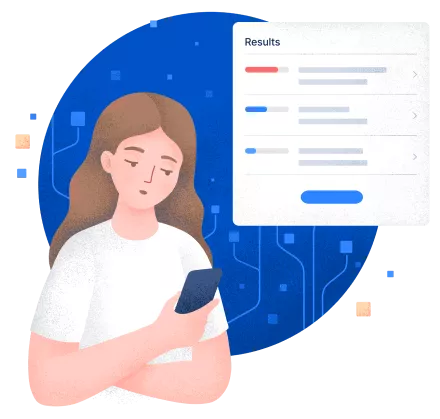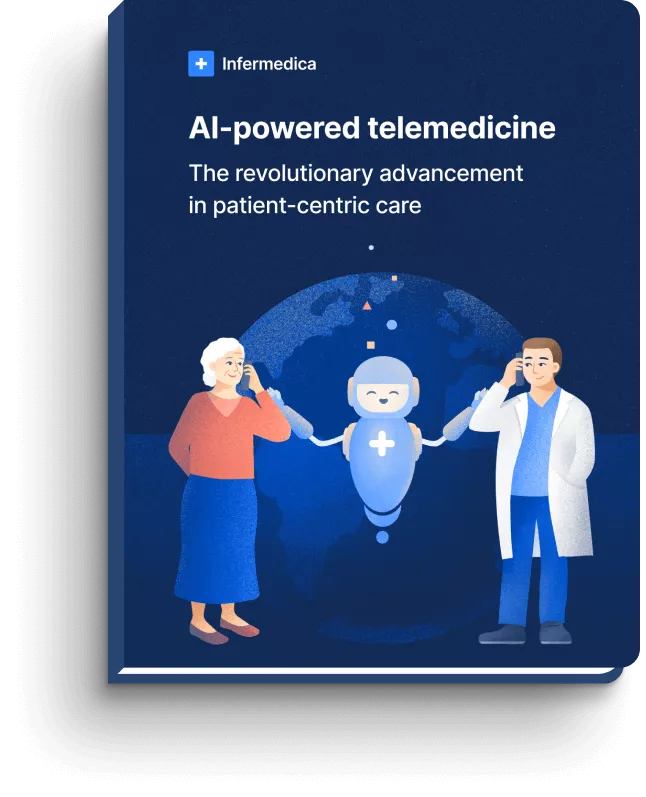
Artificial Intelligence (AI) has emerged as a groundbreaking technology with immense potential to transform various industries, and healthcare is no exception. With its ability to process vast amounts of data and perform complex tasks, AI's integration into healthcare’s ecosystem has the potential to provide more accurate diagnoses, improved patient outcomes, and streamlined medical processes. From disease detection to personalized treatment plans, AI is already playing a vital role in reshaping the future of healthcare. In this article, we explore some of the ways AI is being utilized in healthcare today.

AI is reshaping the way healthcare is delivered and its potential to revolutionize healthcare is unparalleled. Illustration by Magdalena Kościańska and Aga Więckowska.
Are you excited about AI’s potential of revolutionizing the world? At Infermedica, we sure are! That’s why we asked several experts from across the world to share their favorite applications of AI in healthcare along with their insights and opinions. Let’s explore the remarkable ways AI is already reshaping the industry together!
Insight by:
Irving Kent Loh MD FACC FAHA FCCP FACP, Chief Medical Officer & Cofounder, Infermedica
Generative AI/large language models (LLMs) create text and images based on data scrubbed from the universe of sources available in written and digital forms. What has recently caught the attention of our field (and the media), is LLM’s ability to pass professional licensure examinations in medicine and law without specialized training with savant-like performance - truly astounding!
Adoption and adaptation of these generative AI/LLM technologies are being integrated into healthcare products and services. Beyond administrative and back-office applications, the clinical interface between healthcare information, clinicians, and patients is changing forever. Sorting out symptoms, diagnoses, optimal management, based on evidence is now possible. Equity in healthcare may be realizable.
LLMs use a form of intelligence that is not human based. The LLM may come to similar conclusions as doctors without any true understanding of the presenting symptoms and underlying diseases, but rather by exploiting statistical associations and patterns present in the text corpora they have been trained on, or the text information they might receive as part of the input context. However, LLMs may minimize the wasted time lost in futile, unnecessary, and costly diagnostic testing, by directing and focusing clinicians on those strategies that can confirm or deny possible diagnoses or suggest additional considerations. Similar result as humans, but different path to get there.
The issue is trust. If the goal is to get to the best and most accurate answer possible, and the LLM gets us there, then there may be sufficient trust to confidently use the technology.
That being said, it is also important to acknowledge that although recent advancements in large language models are impressive and they show great promise, it’s vital that technology companies and their customers also understand their limitations. It’s necessary to pick the right tools for the right problems and hold each other to the highest standards of validation before they can be applied safely and successfully in medical devices.
Ideally, clinical care and health outcomes will be improved at a reduced cost. Value based care will be closer to actualization.
Note from the author:
It is essential to adhere to the highest standards of validation before applying LLMs in medical devices. Safety of medical applications requires thorough evaluation and validation processes. Transparency and accountability are crucial to ensure responsible implementation and address any potential risks. Clinical safety is non-negotiable when incorporating AI into healthcare practices. Our solution undergoes regular testing through assessments conducted on thousands of well-documented clinical cases. Our dedicated Clinical Validation team ensures the accuracy of the results. Read more about Infermedica’s AI-powered solutions.

Due to certain current limitations, language models are not well-suited to clinical decision support without the presence of human supervision. Right now, LLMs and AI are not meant to replace physicians; instead, their primary utility lies in bridging communication gaps between physicians and patients. Such considerations are raised in a comment made by George A. Gellert, MD, MPH, MPA and Jakub Jaszczak, MD from Infermedica, and published as a response to a JAMA article about cardiovascular disease prevention recommendations from an online chat-based AI model.
Check Infermedica’s comment on the article published in JAMA, one of the world’s leading international peer-reviewed general medical journals.
Insight by:
Jakub Jaszczak, Medical Doctor (PM,MED), Infermedica
One of my favorite use cases for AI in healthcare is, by the way, one of the oldest ones. I mean signal analysis — so the way AI may interpret data from electronic signals, like electrocardiogram (ECG), pulsoximeter, electronic stethoscope, continuous glucose monitor (CGM), and so on and so on. Where is such AI used? Pretty much everywhere. In hospitals there are some professional tools that assist doctors in analyzing results, but honestly many of us have had contact with some kind of signal analysis. For example, ECG or pulsoximeter in a smartwatch, a remote stethoscope to monitor your baby's allergy, or a cardiotocography (CTG) — the waistband with sensors given in hospital to pregnant women to monitor their baby’s heartbeat. Even the app that counts your steps uses AI for signal analysis!
Why do I like these? In the past such examinations — ECG, pulsoximetry, lung auscultation — were a domain exclusive to doctors. We’ve spent long months learning about them in med school — the presence and shape of waves in ECG, elevation of ST segment or RR intervals in ECG, rhonchi and rales in lung auscultation (listening to the body sounds with a stethoscope) — mastering those skills through study and practice. And now AI has acquired those skills and brought them to the public. Many of the skills we’ve learned could be now acquired through a different and much easier way.
Of course, wide access to physical examinations has its risks - that knowledge has been brought to people (e.g. by companies providing such solutions) but did not provide the diagnosis and treatment capabilities at the same time. So you can see that according to your Apple Watch you may have a Cardiac Arrhythmia, but you do not know what it means nor how to treat it. What you do know however, is that you should call 911. Those preliminary triage capabilities and alerts for patients at risk give us a new and unique skill — we can reach patients at their homes and respond even faster to health problems before a true life-threatening emergency arises. On the other side, it could give reassurance to patients, e.g. to a parent that can examine their baby during infection and make sure that their lungs are still clear.
What are the next steps for this technology? Well in my opinion, it won't replace doctors — the difficulty and responsibility of making the decision about one's treatment should stay with professionals. But it would definitely expand the scope of applications and the coverage of different diseases. Also, the link between the interpretation of a patient’s lung or heart function and their other symptoms or risk factors seems to be an opportunity at hand. The more holistic approach of such tools — encompassing the full spectrum of patients' health issues — seems to be the next step for healthtech development.

Explore the potential of AI and telemedicine to revolutionize patient care and the benefits of their synergistic integration.
Insight by:
Pawel Lipinski, CEO, Talkie.ai
Artificial Intelligence has significant potential and a wide range of applications for voice assistance in the healthcare industry. Talkie.ai, a voice AI automation app for better patient access, is an important example. It revolutionizes telephone-based patient access, enabling zero-wait-times for patients and 24/7 availability.
As a result of enabling self-service scenarios for patients, healthcare providers that use voice AI in their patient engagement program significantly reduce their front-desk staff turnover and burnout. It can also lower operating costs; voice AI solutions from Talkie.ai enable automating multiple time-intensive administrative tasks at the front desk, such as appointment management, handling prescription refill requests, patient satisfaction surveys, or preventive medicine campaigns. This time-saving automation lifts an enormous workload from operating staff.
AI voice automation from Talkie.ai can also seamlessly perform medical triage over the phone, update a patient’s medical records on a connected database in real-time, and, if necessary, book appointments with medical professionals, creating smooth and efficient patient experience with natural, human-like interactions between a patient and AI.

The real winners in this space will be solutions that combine the strengths of different AI technologies in ways which can also mitigate their potential weaknesses — this is a complex space and healthcare organizations will need to find trusted partners to help them navigate this. Having created one of the safest patient triage technologies in the world, Infermedica is committed to solving the biggest challenges for healthcare globally. We are exploring the use of LLMs to supplement our existing expert AI, we see great potential but much still to learn. We'll navigate this space with care, drawing on our existing expertise of delivering AI-powered solutions to over 100 companies around the world, and we'll share our learnings transparently as we go.
VP of Artificial Intelligence, Infermedica
AI is reshaping the way healthcare is delivered and its potential to revolutionize healthcare across the globe is enormous.
With continued advancements and ongoing research, we can expect AI to play an even more significant role in the future — improving patient outcomes, reducing healthcare costs, and transforming healthcare delivery at-scale. However, as AI continues to evolve, it is crucial to strike a balance between technology and the human intervention required to provide the best possible care for patients. The integration of AI into healthcare holds great promise for the future, paving the way for a more efficient, precise, and patient-centric healthcare system.
Contact us to discuss how you can integrate AI-powered solutions into your business.
The original version of this page was published at: https://infermedica.com/blog/articles/unleashing-the-power-of-ai-global-experts-explore-its-impact-on-healthcare-today
Infermedica's mission is to make healthcare accessible, convenient, and affordable for everyone worldwide, by automating primary care from symptom to outcome. The company develops a Medical Guidan... Read more
Emergency departments (EDs) are often overcrowded, leading to long wait times and a decrease in the quality of care for patients. However, 67% of ED visits are considered avoidable. ...read more
Interview with Natalia Deryło and Tom Fernandes, Product Managers at Infermedica.Infermedica Intake is a new module for digital patient intake and consultation support for patients ...read more
NOTE: This article was published in September 2023. Commentary on the status of legislation is accurate at the time of writing.No doubt about it, Artificial intelligence (AI) is bursting ...read more
As the healthcare industry becomes more competitive, organizations are under mounting pressure to meet the evolving demands of their consumers. In this article, we explore the subject ...read more